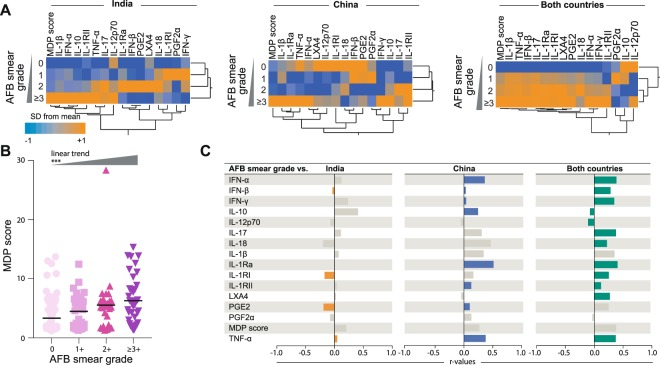Molecular degree of perturbation of plasma inflammatory markers associated with tuberculosis reveals distinct disease profiles between Indian and Chinese populations.
Tuberculosis (TB) is a chronic inflammatory disease caused by Mycobacterium tuberculosis infection which causes tremendous morbidity and mortality worldwide. Clinical presentation of TB patients is very diverse and disease heterogeneity is associated with changes in biomarker signatures. Here, we compared at the molecular level the extent of individual inflammatory perturbation of plasma protein and lipid mediators associated with TB in patients in China versus India. We performed a cross-sectional study analyzing the overall degree of inflammatory perturbation in treatment-naïve pulmonary TB patients and uninfected individuals from India (TB: n = 97, healthy: n = 20) and China (TB: n = 100, healthy: n = 11). We employed the molecular degree of perturbation (MDP) adapted to plasma biomarkers to examine the overall changes in inflammation between these countries. M. tuberculosis infection caused a significant degree of molecular perturbation in patients from both countries, with higher perturbation detected in India. Interestingly, there were differences in biomarker perturbation patterns and the overall degree of inflammation. Patients with severe TB exhibited increased MDP values and Indian patients with this condition exhibited even higher degree of perturbation compared to Chinese patients. Network analyses identified IFN-α, IFN-β, IL-1RI and TNF-α as combined biomarkers that account for the overall molecular perturbation in the entire study population. Our results delineate the magnitude of the systemic inflammatory perturbation in pulmonary TB and reveal qualitative changes in inflammatory profiles between two countries with high disease prevalence.
Authors
Deivide Oliveira-de-Souza; Caian L Vinhaes; Maria B Arriaga; Nathella Pavan Kumar; Juan M Cubillos-Angulo; Ruiru Shi; Wang Wei; Xing Yuan; Guolong Zhang; Ying Cai; Clifton E Barry; Laura E Via; Alan Sher; Subash Babu; Katrin D Mayer-Barber; Helder I Nakaya; Kiyoshi F Fukutani; Bruno B Andrade
External link
Publication Year
Publication Journal
Associeted Project
Microbiology or Immunology
Lista de serviços
-
RASL11A, member of a novel small monomeric GTPase gene family, is down-regulated in prostate tumors.RASL11A, member of a novel small monomeric GTPase gene family, is down-regulated in prostate tumors.
-
Splice variants of TLE family genes and up-regulation of a TLE3 isoform in prostate tumors.Splice variants of TLE family genes and up-regulation of a TLE3 isoform in prostate tumors.
-
Concepts on Microarray Design for Genome and Transcriptome AnalysesConcepts on Microarray Design for Genome and Transcriptome Analyses
-
The iron stimulon of Xylella fastidiosa includes genes for type IV pilus and colicin V-like bacteriocins.The iron stimulon of Xylella fastidiosa includes genes for type IV pilus and colicin V-like bacteriocins.
-
Origins of the Xylella fastidiosa prophage-like regions and their impact in genome differentiation.Origins of the Xylella fastidiosa prophage-like regions and their impact in genome differentiation.
-
The role of prophage in plant-pathogenic bacteria.The role of prophage in plant-pathogenic bacteria.
-
Genetic control of immune response and susceptibility to infectious diseases.Genetic control of immune response and susceptibility to infectious diseases.
-
Building capacity for advances in tuberculosis research; proceedings of the third RePORT international meeting.Building capacity for advances in tuberculosis research; proceedings of the third RePORT international meeting.
-
São Paulo School of Advanced Sciences on Vaccines: an overview.São Paulo School of Advanced Sciences on Vaccines: an overview.
-
A reasonable request for true data sharing.A reasonable request for true data sharing.

